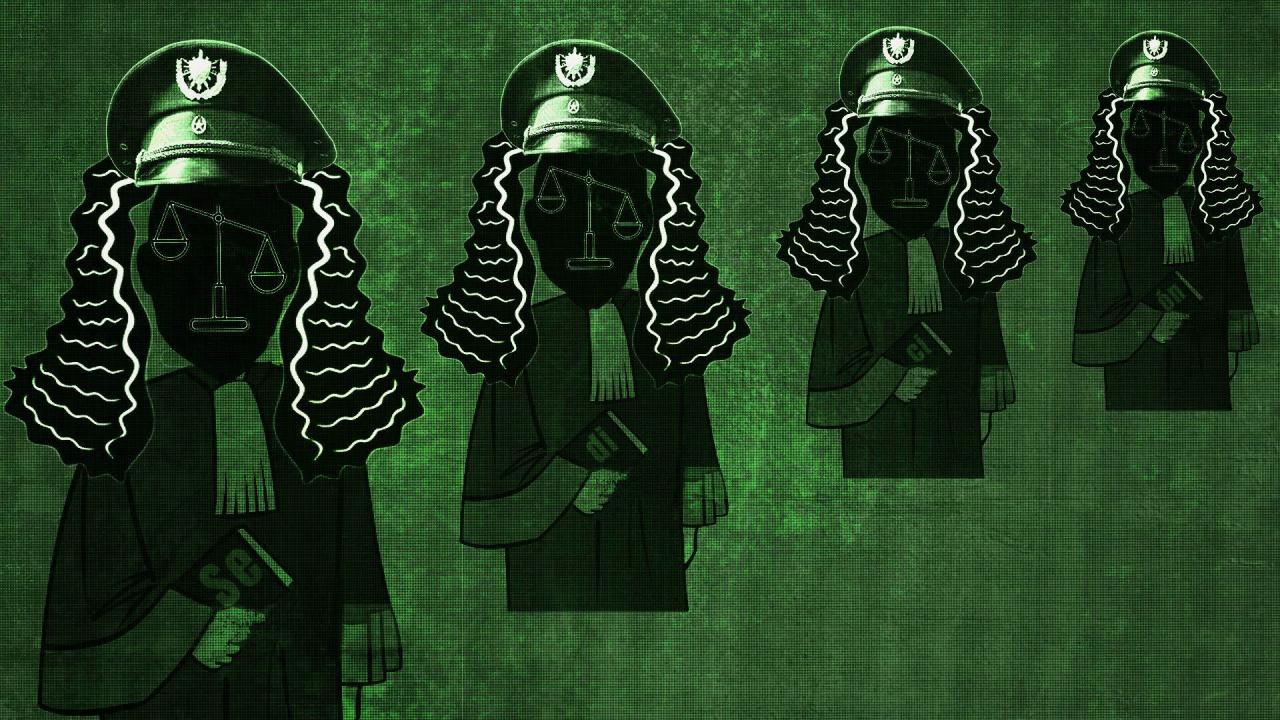The accusations alleging the crime of sedition and the requests for severe sentences against the 11-J protesters in Cuba have exposed the role of the Public Prosecutor as a judicial arm facilitating the regime's repression. This body will have to be held accountable in the future for its submission to State Security, but Cuban judges will also have to answer for turning their backs on justice and breaking their own rules.
Directive No. 247 of March 23, 2020 instructs the courts in the necessary observance of the principles of the presumption of innocence, effective judicial protection, and the others that make up criminal due process, to achieve effectiveness and uniformity in the system for the appraisal of evidence on the basis of rational criteria.
The initiation of the case, on October 19, 2021, of the Chamber of Crimes Against State Security of the People's Provincial Court of Havana, in addition to ratifying the political nature of the crimes alleged, constitutes the first violation of the aforementioned instruction and contravenes the guarantee of due process in the investigative phase.
The Court recorded in its official records as a pending trial Preparatory Phase File 145-C/2021 of the Specialized Body for the Criminal Investigation of Crime as Case 14, 2021, without taking into account the insufficient evidence, lack of impartial witnesses, and the lack of any rational basis underlying the accusations of the crime of sedition.
Prosecutor Mabel Palacios requested 15 to 27 years of imprisonment for this crime for 22 defendants, of whom seven are between 17 and 19 years of age: Nelson Néstor Rivero Garzón, 17; Emiyoslán Román Rodríguez, 18; Yensy Jorge Machado González, 18; Frank Daniel Roy Sotolongo, 19; Yassell Guerra Campos, 19, and Marcos Antonio Alfonso Breto, 19. For all of them the Prosecutor's request was 15 years in prison. In the case of 18-year-old Yeinier Ibañez Boudet, the sentence requested was 18 years in prison.
Despite the fact that they have no criminal records, the precautionary measure of provisional imprisonment was imposed on all of them. The judges assigned to the case - Maikel Santana Cabrera, Lourdes García Gómez, Elizabeth Águila Camacho, Ileana Freijes Tejera and Fernando Torriente Llovet - decided to maintain "provisional prison for all the accused given the participation purported, the possibility of them evading the criminal proceedings initiated, and the social harm of their alleged actions."
By issuing this generic pronouncement, without addressing each case specifically, the judges violated the principle of individuality in the proceedings. Moreover, they did not cite grounds to justify, in each case, the possibility of their attempting to evade justice.
In doing so they also violated Article 3.1 of the U.N. Convention on the Rights of the Child, signed and ratified by the Cuban State, which establishes that "in all measures concerning children taken by public welfare institutions, public or private; the courts, administrative authorities and legislative bodies, primary consideration will be given to the best interests of the child."
It should be noted that six of these defendants are minors, but are being assign criminal responsibility anyway. Furthermore, the principles of the "United Nations Standard Minimum Rules for the Administration of Juvenile Justice," known as the Beijing Rules, state that "imprisonment shall only be imposed after careful consideration of the situation, during the shortest possible period, and only in the case of serious crimes" and that "the minor should only be incarcerated after having considered other alternatives."
Accusing one of a crime as serious as sedition could justify provisional imprisonment, but precisely this accusation is the Prosecutor's first atrocity. As noted in a previous DIARIO DE CUBA article, in the criminal codes of most Western countries, sedition is considered to require the existence of, among other elements, organization and exact political coherence between the members of the group in question, which excludes spontaneity.
Did the prosecutor, Palacios Aties, present evidence of organization and political coherence between the defendants, or of some degree of planning of the protests to support his accusation of this crime?
Regarding the files of the preparatory phase and the attestations presented by the prosecutor, judges are supposed to verify whether the requisite evidence-gathering procedures were carried out to verify the actions committed by the accused.
However, in this evidentiary sphere, the aforementioned judges did not question the testimony presented against the accused. The eight witnesses belong to the Ministry of the Interior (MININT). One is a Police Investigator/Complainant, six are officers in the Special Tactical Unit of 100 and Aldabó de Boyeros, and the other is the head of the Capri Police Unit, located in Güinera, where a police officer killed Diubis Laurencio Tejeda, the only fatality recognized by the Government during the protests.
In this town, the Police fired several shots to disperse the protesters. 16-year-old teenager Yoel Misael Fuentes García was hit in the kneecap.
The judges did not take into account that the defendants, unarmed, acted in self-defense by throwing stones they found within their reach at the police officers.
The judges also did not take note of the fact that the Prosecutor's Office failed to provide reliable or categorical evidence that identified and linked certain defendants to given acts of violence. When comparing them to the people appearing in a video of the demonstrations, the Criminal Expert Opinion simply states that: "they probably correspond."
The judges did not dismiss or challenge this evidence, which raises reasonable doubt that the defendants are the perpetrators of the acts shown in the video.
Even if they are, and they did throw stones at the Police, they would have committed the crime of assault, and not the one with which they are being charged. The absence of elements justifying the charge of sedition should lead to it being dismissed.
